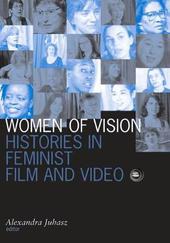
|
Women Of Vision: Histories in Feminist Film and Video
Paperback / softback
Main Details
| Title |
Women Of Vision: Histories in Feminist Film and Video
|
| Authors and Contributors |
By (author) Alexandra Juhasz
|
| Series | Visible Evidence |
|---|
| Physical Properties |
| Format:Paperback / softback | | Pages:360 | | Dimensions(mm): Height 254,Width 178 |
|
| Category/Genre | Films and cinema
History of specific subjects |
|---|
| ISBN/Barcode |
9780816633722
|
| Classifications | Dewey:791.43 791.43082 |
|---|
| Audience | | Undergraduate | | Postgraduate, Research & Scholarly | | Professional & Vocational | |
|---|
|
Publishing Details |
| Publisher |
University of Minnesota Press
|
| Imprint |
University of Minnesota Press
|
| Publication Date |
18 April 2001 |
| Publication Country |
United States
|
Description
Alexandra Juhasz asked twenty-one women to tell their stories -- women whose names make up a who is (and who will be) who of independent and experimental film and video. What emerged in the resulting conversations is a compelling (and previously underdocumented) history of feminism and feminist film and video, from its origins in the fifties and sixties to its apex in the seventies, to today.Women of Vision is a companion piece to Juhasz's 1998 documentary of the same name. The book presents the complete interviews, allowing readers to hear directly the voices of these articulate, passionate women in an interactive remembering of feminist media history. Juhasz's introduction provides a historical, theoretical, and aesthetic context for the interviews. These subjects have all shaped late twentieth-century film and video in fundamental ways, either as artists, producers, distributors, critics, or scholars, and they all believe that media are the most powerful tools for effecting change. Yet they are a very diverse group, with widely varying personal and professional backgrounds. By presenting their interviews together, Juhasz shows the differences among those involved in feminist media, but also the connections among them, and the way in which the field has been enriched by their sharing of knowledge and power. In the end, Juhasz not only records these women's careers, she broadens our understanding of feminism and shows how feminist history and documentary are made.
|